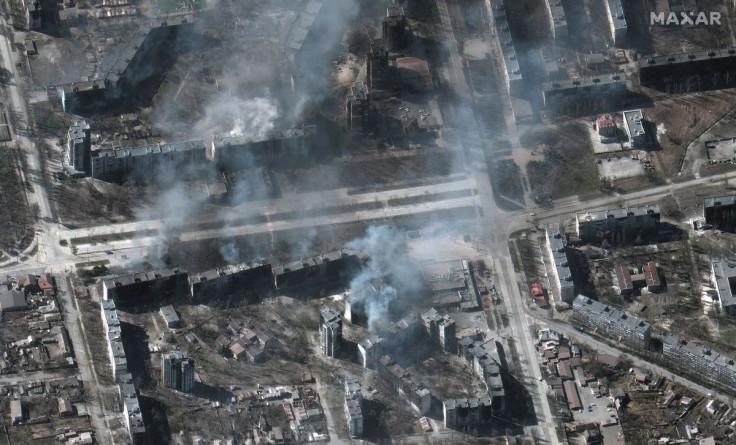'Sanctions Never Deter': Biden Defends Response To Russia As War In Ukraine Enters First Month
President Joe Biden arrived at NATO headquarters in Brussels on Thursday to discuss the alliance’s next steps to punish Russia for its war against Ukraine. At the same time, the president was put into the position of defending his own actions from charges that he is not doing enough to deter Russia’s President Vladimir Putin.
At a press conference ahead of his meeting with European leaders before embarking on a trip to Poland, Biden was asked whether or not sanctions were working to deter Putin. Biden rejected this characterization and pivoted to emphasize that the sanctions on Russia were aimed at imposing costs rather than deterring further escalation against Ukraine.
“Sanctions never deter,” Biden responded with a hint of agitation.
“The maintenance of sanctions, the maintenance of sanctions, the increasing the pain and the demonstration why I asked for this NATO meeting today is to be sure that after a month, we will sustain what we’re doing not just next month, the following month, but for the remainder of this entire year, that’s what will stop him,” he explained.
The argument for how best to deter further Russian aggression, against Ukraine or the NATO alliance, has been an ongoing one for the Biden administration to address. From the beginning of the crisis in early December, Biden repeated that the United States would respond with massive economic sanctions if Russia was to invade Ukraine. In readouts of conversations with Putin in December and February, Biden reiterated the U.S.’s commitment to imposing costs on Russia’s economy together with its partners in Europe.
Ultimately, Putin did not heed these warnings and went ahead with his invasion of Ukraine exactly a month ago on Feb. 24. In response, the U.S. and its allies launched a series of sweeping financial sanctions that cut straight into the value of the Russian ruble, froze much of the foreign currency reserves of the Russian central bank and sent Russian oligarchs scrambling to secure their assets after the West promised to seize them.
Upon arriving in Brussels, the White House announced a new round of sanctions aimed at the Russian central bank’s gold reserves as well as individual sanctions on over 300 Russian lawmakers. However, asked by the same reporter if he thought these sanctions would change Putin’s calculus, Biden responded “No.”

Biden has been forced to walk a fine line between his European allies, who remain divided on how much farther to go in terms of economic sanctions. This balancing act is also important to maintain back home in Washington, where members of Congress are demanding stronger actions against Russia as well as the American public in favor of a toughened stance.
Despite an initial bump in approval ratings over his handling of the war, a new Associated Press/NORC poll found that 56% of Americans said they felt Biden was not tough enough on Russia. A majority of voters regardless of partisan bias said they support the current sanctions, but Republicans and Democrats alike indicate they’d like to see more done to help Ukraine.
Republicans, in particular, have come out in force against Biden for his administration’s refusal to provide Soviet-era MiG-29 fighter jets to Ukraine to defend itself from Russia. Others have called for the U.S. to establish a no-fly zone over western Ukraine, but senior Republicans including Senate Majority Leader Mitch McConnell (R-KY) have demurred from endorsing the move.
Democrats for their part have generally remained supportive of Biden’s handling of the war in Ukraine with 53% of Democratic voters approving of his handling of Russia. However, 43% indicated that they did not think Biden was doing enough and some Democratic senators have expressed similar points of skepticism as their Republican counterparts on whether the president is holding back on further military support to Ukraine.
To date, the Biden administration has dedicated over $13 billion in military aid to Ukraine’s military. After a speech by Ukrainian President Voldomyr Zelensky to Congress last week, Biden designated a further $800 million that included additional Stinger and Javelin missiles as well as Switchblade “kamikaze” drones.
© Copyright IBTimes 2024. All rights reserved.





















